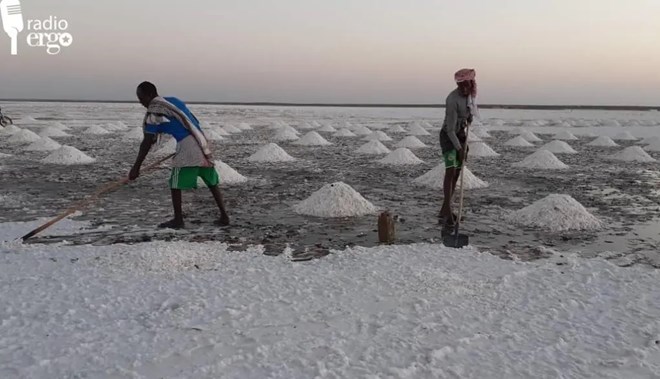
Thursday April 4, 2024

Salt harvesting in Somalia/File Photo/Ergo
(ERGO) – More than 1,000 former pastoralists have turned to salt harvesting to make ends meet, digging out the salt deposits in caves located in Hinlabi, on the coast of central Somalia’s Mudug region.
Mohamed Ahmed Adan, 42, started salt mining in January and has been making $5 a day from the salt he sells to businessmen, who transport it for sale in towns including Adado, Galkayo, Dhusamareb and Hobyo.
He and his wife and seven children had been struggling since losing their livestock in the drought. Severe and prolonged drought spanning over two years killed their entire herd of 150 goats.
He was given one goat by his relatives and sold it immediately to buy an area to mine. What he earns now has helped put the family back on their feet. Mohamed’s children resumed school in March after dropping out more than a year ago due to fee arrears.
“I manage to pay for all our bills and the children’s education, two of them are in grade two and the others have started school. We take our supplies from local shops and repay them when we get the cash,” he said.
He sets aside $1.5 each day to help repay the $800 worth of food he took from local stores over the previous tough months. He said this is the best chance he has at repaying the debts.
Although he is happy to be getting a reasonably stable income, they need equipment to improve their business.
“If we could get help, we would need spades for digging the salt, shoes, and carts. The salt also hurts our hands. We need aid organisations to help us,” he said.
Abdullahi Mohamed Hassan, another former pastoralist, lost 70 goats and five camels to drought and turned to an abandoned salt cave owned by his late father. Abdullahi said he’s been mining more salt than he had initially anticipated.
“Salt mining was very good and easy this year. We have got abundant salt; we can now get months’ worth of harvest in just a week. We haven’t experienced any challenges, just good profits,” he said.
Abdullahi learned from his father and another relative who engaged in salt mining recently. He has been earning $5-6 a day, which helps buy his family’s immediate needs and enables him to save small amounts towards paying off his $600 debts at local shops.
“I don’t have any other source of income and we were depending on loans until we got this stable income from the salt. We’re now able to buy the food and water we need and I also hope to repay the loan,” he said.
The salt caves are a three kilometre walk from where he lives and he says the work is hard. However, he wants to be able to buy more goats and return to pastoralism. He thinks this will be possible if there is heavy ‘gu season rainfall that will increase the amount of salt in the caves.
The commissioner of Hinlabi, Dahir Ali, said the local authority has been raising awareness among the miners to harvest the salt once the water has completely evaporated off and only the dry crystals remain. This improves the harvest.
He said 1,100 people in Hinlabi earn their living from salt mining.
“About 90% of the locals in Hinlabi depend on the salt. They don’t have livestock or businesses to depend on. There are different ways people make income from the salt, some mine it whilst others are porters and others sell the sacks the salt is packed in. There could be five different streams of income generated from one truck load,” he said.
He added that local people needed better training and equipment to refine their work and improve their income from the salt mines. He asked aid agencies if they would support this livelihood area.